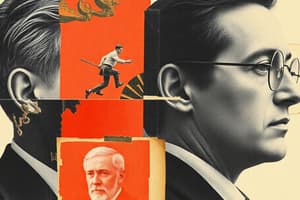Podcast
Questions and Answers
Which of the following are Classical Theories Topics and Proponents? (Select all that apply)
Which of the following are Classical Theories Topics and Proponents? (Select all that apply)
- Theory X and Y (McGregor)
- Scientific Management (F.Taylor) (correct)
- Hierarchy of Needs (A.Maslow)
- Bureaucracy (M.Weber) (correct)
Which of the following are Neo-Classical Theories Topics and Proponents? (Select all that apply)
Which of the following are Neo-Classical Theories Topics and Proponents? (Select all that apply)
- Theory X and Y (McGregor) (correct)
- The Human Relations (E.Mayo) (correct)
- Scientific Management (F.Taylor)
- Bureaucracy (M.Weber)
What is Classical Theory?
What is Classical Theory?
Views the organization as a machine and human beings as components of that machine.
What does Scientific Management focus on?
What does Scientific Management focus on?
In ____________ view, if a work is analyzed scientifically it will be possible to find one best way to do it.
In ____________ view, if a work is analyzed scientifically it will be possible to find one best way to do it.
Which of the following are Principles of Scientific Management? (Select all that apply)
Which of the following are Principles of Scientific Management? (Select all that apply)
Which of the following are Principles of Management? (Select all that apply)
Which of the following are Principles of Management? (Select all that apply)
What does Max Weber say about bureaucracies?
What does Max Weber say about bureaucracies?
According to ___________, bureaucracies are goal-oriented organizations designed according to rational principles.
According to ___________, bureaucracies are goal-oriented organizations designed according to rational principles.
Which of the following are characteristics of an ideal-type bureaucracy? (Select all that apply)
Which of the following are characteristics of an ideal-type bureaucracy? (Select all that apply)
What is Neo-Classical Theory?
What is Neo-Classical Theory?
What does the Neo-Classical approach emphasize?
What does the Neo-Classical approach emphasize?
Which of the following are main propositions of the Neo-Classical Theory? (Select all that apply)
Which of the following are main propositions of the Neo-Classical Theory? (Select all that apply)
What is the focus of The Human Relations theory?
What is the focus of The Human Relations theory?
What was the aim of the Hawthorne Studies Experiment?
What was the aim of the Hawthorne Studies Experiment?
Flashcards are hidden until you start studying
Study Notes
Classical Theories Topics and Proponents
- Scientific Management: Introduced by F. Taylor, emphasizes the scientific analysis of work to find the most efficient methods.
- 14 Management Principles: Developed by H. Fayol, these principles guide organization and management practices.
- Bureaucracy: Formulated by M. Weber, views organizations as rational structures with clear hierarchies.
Neo-Classical Theories Topics and Proponents
- Human Relations: E. Mayo's approach highlighting the importance of social factors in the workplace.
- Hierarchy of Needs: A. Maslow's model illustrating the progression of human needs from basic to psychological.
- Theory X and Y: McGregor's theories on management styles based on differing assumptions about employee motivation.
Classical Theory
- Views organizations as machines and workers as parts, focused primarily on physical and economic needs.
- Promotes efficiency through rigid structures and scientific management, emphasizing the importance of work efficiency.
Scientific Management
- Defined as the science of determining the best and most cost-effective way to perform tasks.
- Aims to improve efficiency and productivity in the workplace.
Taylor's Perspective
- Advocates that scientific analysis can uncover the most effective ways to perform jobs.
Principles of Scientific Management
- Emphasizes using scientific methods over traditional practices.
- Focuses on selecting, training, and developing workers for optimal performance.
- Stresses division of labor and responsibilities.
- Encourages cooperation between management and employees for better outcomes.
Principles of Management
- Foundations include division of work, authority and responsibility, discipline, unity of command, unity of direction, and equity.
- Highlights the need for stability, initiative, and cooperation among staff.
Max Weber
- Advocated for the rational and intellectual organization structure known as bureaucracy.
Bureaucracy Characteristics
- Includes a hierarchy of authority, formal rules and regulations, specialized labor division, merit-based promotion, separation of personal and professional life, and documented management processes.
Neo-Classical Theory
- Challenges classical views, recognizing that workers have social needs alongside economic ones.
- Focuses on the impact of social dynamics on organizational efficiency and productivity.
Key Elements of Neo-Classical Approach
- Analyzes organizational situations through social, economic, and technical lenses.
- Applies clinical methods to understand group behaviors similarly to medical diagnoses.
Main Propositions of Neo-Classical Theory
- Organizations are social systems with interdependent parts.
- Recognizes the existence and influence of informal organizations within formal structures.
- Emphasizes that individual behavior can be predicted by social factors.
- Highlights the complexity of motivation and the influence of socio-psychological factors.
- Examines the conflict between individual and organizational goals, advocating for reconciliation of both.
- Stresses the necessity of teamwork for enhancing productivity.
- Acknowledges that human behavior is not always rational or logical.
- Communication is vital for effective organizational functioning and employee sentiment.
The Human Relations Approach
- Emphasizes the significance of the human element in organizations.
- Focuses on improving worker satisfaction and informal workplace dynamics to enhance productivity.
- Advocates for recognizing and addressing the social needs of employees.
Hawthorne Studies Experiment
- A series of studies aimed at better understanding the impact of various working conditions on employee productivity.
- Notably included Illumination Experiments conducted between 1924-1927.
Studying That Suits You
Use AI to generate personalized quizzes and flashcards to suit your learning preferences.




